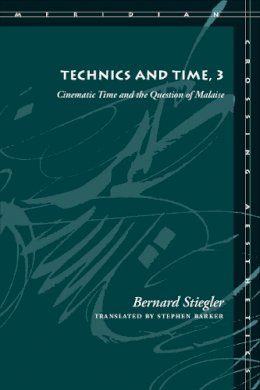9%OFF

Stock image for illustration purposes only - book cover, edition or condition may vary.
Technics and Time, 3: Cinematic Time and the Question of Malaise
Bernard Stiegler
€ 33.99
€ 30.94
FREE Delivery in Ireland
Description for Technics and Time, 3: Cinematic Time and the Question of Malaise
Paperback. Technics and Time, 3 furthers Stiegler's critique of technics, working (back) through Kant in order to examine the nature of "cinematic time" relative to phenomenology and hypertechnology. Translator(s): Barker, Stephen. Series: Meridian: Crossing Aesthetics. Num Pages: 280 pages. BIC Classification: HP. Category: (P) Professional & Vocational. Dimension: 227 x 191 x 16. Weight in Grams: 378.
In the first two volumes of Technics and Time, Bernard Stiegler worked carefully through Heidegger's and Husserl's relationship to technics and technology. Here, in volume three, he turns his attention to the prolematic relationship to technics he finds in Kant's Critique of Pure Reason, particularly in the two versions of the Transcendental Deduction. Stiegler relates this problematic to the "cinematic nature" of time, which precedes cinema itself but reaches an apotheosis in it as the exteriorization process of schema, through tertiary retentions and their mechanisms. The book focuses on the relationship between these themes and the "culture industry"— as defined ... Read more
Show LessProduct Details
Format
Paperback
Publication date
2010
Publisher
Stanford University Press
Number of pages
280
Condition
New
Series
Meridian: Crossing Aesthetics
Number of Pages
280
Place of Publication
Palo Alto, United States
ISBN
9780804761680
SKU
V9780804761680
Shipping Time
Usually ships in 7 to 11 working days
Ref
99-50
About Bernard Stiegler
Bernard Stiegler heads the Department of Cultural Development at the Pompidou Center in Paris and is co-founder of the political group Ars Industrialis. Stanford University Press has published the first two volumes of Technics and Time, The Fault of Epimetheus (1998) and Disorientation (2008), as well as his Acting Out (2008) and Taking Care of Youth and the Generations (2010). ... Read more
Reviews for Technics and Time, 3: Cinematic Time and the Question of Malaise
